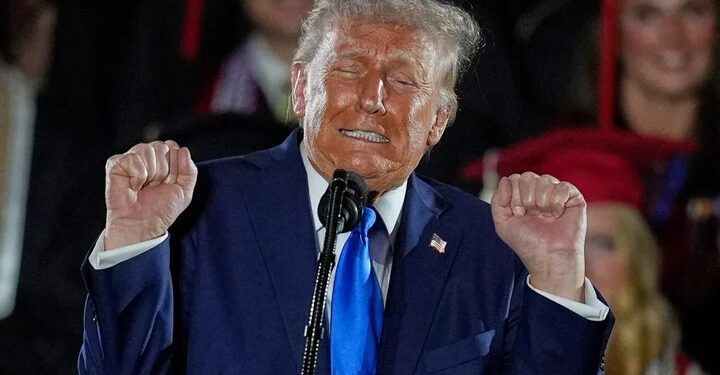Donald Trump has dramatically shifted his stance on Iran, now openly advocating for regime change just days after the US launched a controversial military strike on Iranian nuclear facilities. The former president’s reversal marks a return to the aggressive rhetoric of his first term and has sent shockwaves through diplomatic circles and global markets.
Speaking at a campaign rally in Arizona, Trump declared that “the only way to secure peace in the Middle East is to remove the ayatollahs once and for all.” This sharp pivot comes after years of mixed messaging from Trump, who previously oscillated between threats of “maximum pressure” and vague offers of negotiation. The latest comments suggest he is embracing a far more confrontational doctrine as he seeks to return to the White House in 2025.
Trump’s call for regime change follows last week’s targeted bombing of several nuclear-related facilities in Iran, an operation which he reportedly authorised in coordination with Pentagon officials. While the Biden administration has yet to confirm the full extent of the strike’s consequences, early intelligence reports suggest significant damage to Iranian enrichment capabilities. Trump, meanwhile, has praised the mission as “one of the greatest blows ever struck for peace and safety.”
The former president’s new posture has been met with fierce criticism from many Democratic leaders, who warn that such rhetoric risks inflaming tensions further and dragging the United States into another protracted conflict. Senator Bernie Sanders called the remarks “reckless and dangerous,” while Ro Khanna labelled them “a disastrous return to failed neoconservatism.”
However, Trump’s supporters in the Republican Party have largely embraced the stance, arguing that a decisive break with Tehran’s leadership is necessary. Senate Minority Leader Mitch McConnell praised the speech, saying “the Iranian regime has long posed a threat to American interests and global stability. It’s time we stop pretending otherwise.”
The international community has reacted with alarm. European allies have expressed concern over escalating rhetoric, urging restraint and calling for renewed diplomatic efforts. In a joint statement, France and Germany warned that “calls for regime change undermine prospects for peaceful resolution and increase the risk of widespread regional instability.”
In Tehran, officials condemned Trump’s speech as “hostile and imperialist,” while vowing to resist external interference. The Iranian Revolutionary Guard has since raised its alert level, and reports indicate missile systems have been repositioned near key facilities. Supreme Leader Ayatollah Khamenei responded in a televised address, saying “the Islamic Republic will endure long after Trump and his threats are gone.”
Trump’s hardline turn has also raised questions about his future foreign policy should he return to office. Analysts note that while Trump was often unpredictable in international affairs, he largely avoided full-scale military confrontations during his first term. Now, with the stakes higher and regional tensions already inflamed, a Trump-led push for regime change in Iran could trigger a dangerous geopolitical spiral.
newshub finance



Recent Comments